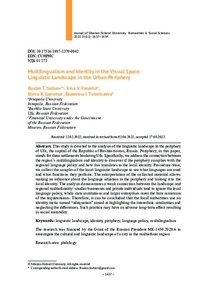Multilingualism and Identity in the Visual Space: Linguistic Landscape in the Urban Periphery
Скачать файл:
URI (для ссылок/цитирований):
https://elib.sfu-kras.ru/handle/2311/148783Автор:
Saduov, Ruslan T.
Varukha, Irina V.
Ganeeva, Elvira R.
Timerbaeva, Ekaterina I.
Садуов, Р. Т.
Варуха, И. В.
Ганеева, Э. Р.
Тимербаева, Е. И.
Дата:
2022-11Журнал:
Журнал Сибирского федерального университета. Гуманитарные науки. Journal of Siberian Federal University. Humanities & Social Sciences; 2022 15 (11)Аннотация:
This study is devoted to the analysis of the linguistic landscape in the periphery of Ufa, the capital of the Republic of Bashkortostan, Russia. Periphery, in this paper, stands for three settlements bordering Ufa. Specifically, we address the connection between the region’s multilingualism and identity to discover if the periphery complies with the regional language policy and how this translates to the local identity. Procedure-wise, we collect the samples of the local linguistic landscape to see what languages are used and what functions they perform. The interpretation of the collected material allows making an inference about the language situation in the periphery and linking it to the local identity. The analysis demonstrates a weak connection between the landscape and regional multiethnicity: smaller businesses and private individuals tend to ignore the local language policy, while state institutions and larger enterprises meet the bare minimum of the requirements. Therefore, it can be concluded that the local authorities use an identity tactic named “adequation” aimed at highlighting the interethnic similarities and neglecting the differences. Such practice may have an adverse long-term effect resulting in social instability Настоящее исследование посвящено анализу языкового ландшафта
на периферии г. Уфа, столицы Республики Башкортостан. В данной работе
периферия включает в себя три населенных пункта в непосредственной
близости к Уфе. Авторы исследуют связь между региональным многоязычием
и идентичностью, что позволяет ответить на вопрос, насколько соблюдается
языковая политика региона и каким образом это связано с местной идентичностью.
Анализ показал, что связь между многоязычием и идентичностью слабая: малые
предприятия и частные лица часто игнорируют языковую политику, в то время как
крупный бизнес и государственные предприятия выдерживают лишь необходимый
минимум требований языковой политики. Таким образом, можно заключить, что
местными властями используется тактика «адеквации», которая подразумевает
уравнивание всех этносов и нивелирование различий между ними. Данная практика
может иметь отрицательные долгосрочные последствия

